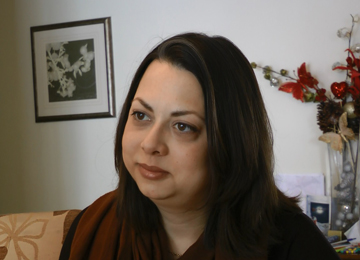Julie

5 years since diagnosis
Age at interview: 35
Julie used to work in her family’s company but had to stop working when she was diagnosed with metastasized breast cancer. She is single and lives with her 8 year old daughter.
Julie received her diagnosis in 2010 when she was 30 years old. She noticed a lump in November while she was putting her 2 year old daughter to bed. In December, she consulted a doctor in a local clinic for her daughter’s bad cough and at that time she also informed this doctor about the lump she had felt. He referred her for further testing but when Julie contacted him again she heard that he had lost the results. Julie lost confidence and was feeling worried so she decided to follow a friend’s advice to visit another clinic that specialized in breast cancer. There she underwent an ultrasound and biopsy immediately and was informed on the same day that it was indeed breast cancer. Julie, who was alone when she heard the news, felt confused and in disbelief. Julie’s treatment consisted of of chemotherapy and radiation. After her treatments were finished, she started hormone therapy and took injections to remain in menopause. She was unable to return to her more normal routine while living with the side-effects of the menopause. This is why she decided, together with the medical team, to stop the injections and continued to be followed by her oncologist. During one of her routine visits, her doctor noticed something and asked her to let her know immediately if she started to feel pain. One weekend, Julie found that she couldn’t get out of bed because of pain in her back. That following Monday, more tests indicated that the cancer had spread to her bones, back and hip. Julie has since changed her hormone therapy and started menopause for a second time after surgery to remove her ovaries. Julie has received excellent support from the medical team and she has great confidence in their help. Julie describes living with cancer as a process that started from the moment she was first diagnosed. Being diagnosed with advanced breast cancer means she had to take a different road, and this time she made a conscious and personal choice to work harder on the psychosocial aspects of living with her illness. She is learning to live with the tiredness, pain, fears and anxiety, and she has found a new force and different ways to appreciate her life. She has had to find ways to give a new meaning to her own life, her social life and the way she raises her daughter. At the moment she finds this new place inspiring and motivating. She would like that the perception and fear towards cancer changes. She hopes to demystify cancer so that people have less fear of it and realize that it is possible to live with advanced breast cancer.
More content
- Alternative and complementary therapies – JulieJulie is under medical treatment at the moment and is very careful about using complementary treatments; she informs her health professional.
- Relating to health care professionals – JulieA good relationship with her medical team gave Julie confidence.
- Coping strategies – JulieJulie explains why she sought out more formal support once she learned that her cancer had spread to her bones.
- Understanding the diagnosis – JulieJulie decided that she wants to focus on what is happening with her and how that can help her.
- First symptoms – JulieAlthough less common, Julie experienced sensitivity directly around the lumps.
- Talking to children about cancer – JulieJulie found that her daughter's presence throughout her cancer journey helped her maintain a normal routine and avoid falling into a depression.
- Preserving fertility – Julie (2)Julie explains why she feels that discussing fertility issues with women undergoing treatment for breast cancer ought to be a matter of routine.
- Preserving fertility – JulieJulie described the factors she took into account and what it was like having only 2 days to make that decision
- Recurrent and metastatic (advanced) breast cancer – Julie (2)Support from health professionals and being responsive to her own needs has allowed Julie to manage her situation.
- Recurrent and metastatic (advanced) breast cancer – JulieJulie's cancer had also spread to her bones. She hadn't realized how commonly metastases occurred.